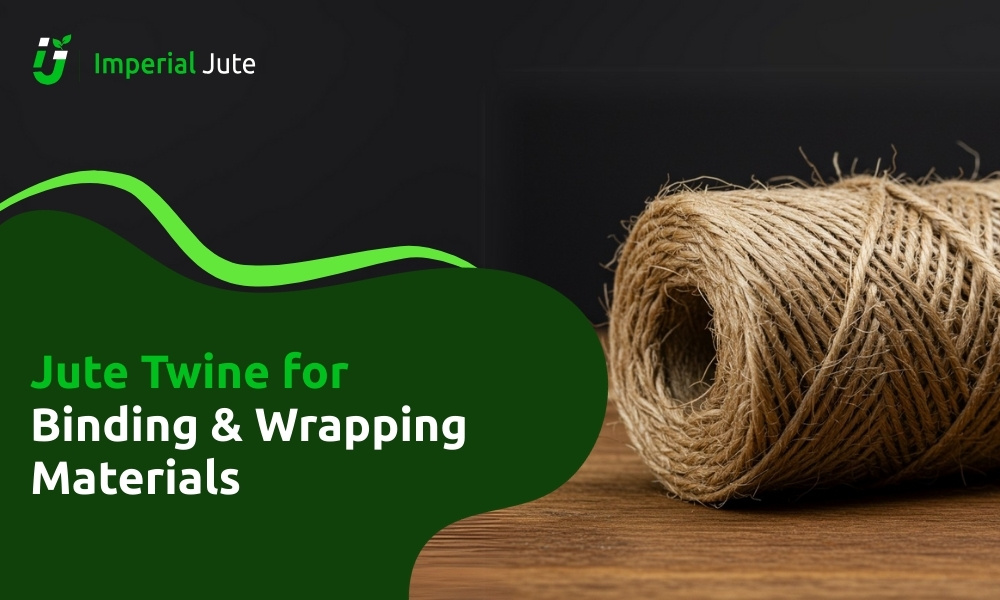Standard Binola jute bags are widely used for packing agricultural products because of their durability, breathability, and eco-compliance. Designed to hold up to 90 KG of cottonseed, grains, or oilseeds, these sacks are preferred in high-volume logistics across Asia, Africa, and the Middle East.
With global jute demand rising due to plastic packaging bans and Environmental, Social, and Governance (ESG) factors, industries are shifting to biodegradable alternatives, such as Binola bags. For bulk buyers, understanding bag specifications, export standards, and sourcing logistics is essential to avoid product mismatches, delays, or compliance issues.
Product Specifications of 90 KG Standard Binola Jute Sacking Bags
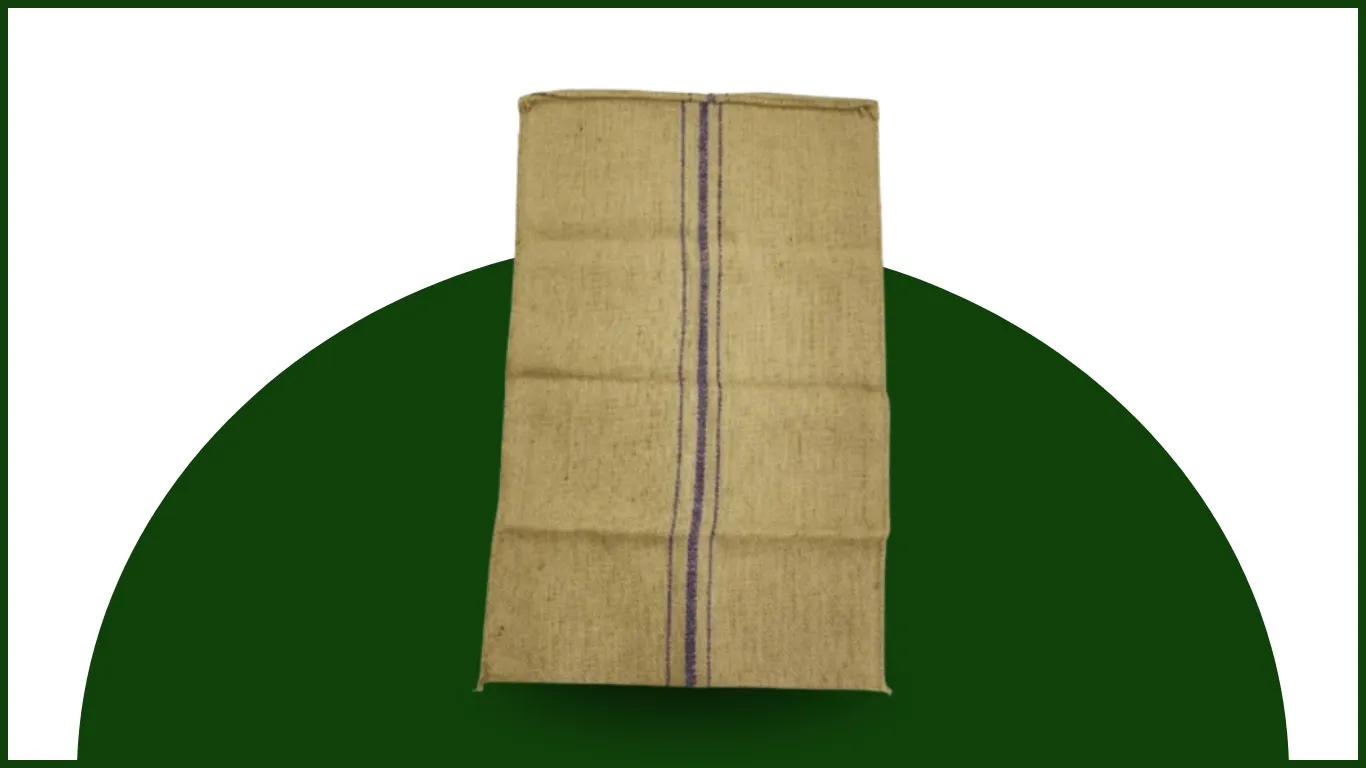
This section outlines the key specifications buyers typically search for while researching Binola jute sacks.
Dimensions, Weight, Weave Type, GSM
Standard 90 KG Binola jute bags are made with a coarse weave and high GSM to ensure durability. The typical specifications include:
- Dimensions: 44 x 26.5 inches (approx. 112 x 68 cm)
- Weight: 1020 grams per piece
- Weave Type: B-Twill (or customized)
- GSM: Ranges from 305 to 315
This size allows the bag to hold up to 90 KG of loosely packed agricultural produce like cottonseed or soybeans.
Strength, Seam, Stitching & Load Capacity
The bags are designed for rugged handling during stacking and cross-border shipment. Their stitch quality is critical.
- Made with heavy-duty 3-ply jute yarn
- Chain-stitched with jute twine
- Seam tested for up to 100 KG pressure
The seam-to-seam strength minimizes the chance of tearing even during rough cargo handling at ports.
Baling Details (50/100 per bale, weight per bale)
These jute sacks are compressed into bales to reduce container space usage. Two common packing standards are used:
- 50 bags per bale, approx. 55–60 KG
- 100 bags per bale, approx. 100–105 KG
Each bale is compressed using a hydraulic press and bound for export compliance.
Optional Add-Ons: Printing, Liner, Branding
Buyers can request optional features such as:
- Single-color stencil printing (e.g., buyer name or logo)
- LDPE liners for moisture resistance
- Laminated inside coating for special commodities
You must keep in mind that these add-ons affect per-unit cost and production time but at the same time help with brand recognition and product protection.
Exporter’s Guide to Buy Standard Binola Jute Bags in Bulk
For buyers looking to import or source Binola jute sacks, here’s the starter guide for making decisions on reliability, pricing, logistics, and sampling before final commitment.
Where to Source Reliable 90 KG Binola Jute Bags
The best place to source 90 KG Binola jute bags is directly from manufacturers based in Bangladesh, the largest global producers of jute. The country has extensive jute mills and export-ready infrastructure.
Bangladesh alone accounts for nearly 75% of the world’s jute exports, supported by the Bangladesh Jute Mills Corporation (BJMC). Working with a direct exporter ensures better pricing, compliance with international standards, and quicker lead times compared to intermediaries.
Look for suppliers with ISO or BSTI (Bangladesh Standards and Testing Institution) certifications, a verified export history, and customization facilities for branding or private labeling. Manufacturer websites, trade fairs, and platforms like Alibaba or ExportHub are common sourcing channels, but direct contact with mill exporters offers more control over quality, price, and terms.
MOQ, Pricing, Payment Terms & Logistics Support
Most manufacturers set the minimum order quantity (MOQ) at 10,000 to 50,000 bags per shipment, depending on customization and current stock levels. Larger quantities often yield better per-unit prices due to economies of scale.
Pricing typically ranges from $0.45 to $0.80 per bag FOB, influenced by jute grade, GSM, customization, and international jute price indexes.
Payment terms vary but usually include:
- 30–50% advance via T/T or LC
- Remaining upon shipment or document presentation
Suppliers often support CIF (Cost, Insurance & Freight) or FOB (Free on Board) shipping. Logistics partners handle container stuffing, fumigation, and loading. Expect 20–24 days transit time from Bangladesh to the UAE, and 28–35 days to ports in Africa or Europe.
How to Request Samples and Custom Orders
For large B2B purchases, requesting physical samples is standard. Most mills provide 3–5 sample units at no cost (excluding courier fees), helping buyers assess seam quality, weave, and printing.
If branding is needed, suppliers offer custom printing services on a minimum order basis. Buyers can submit a high-resolution logo or text (usually black/green ink on natural jute) and receive pre-production samples for approval.
Customization options also include:
- Plastic liners
- Stencil printing
- B-Twill or L-Twill pattern weaving on request
Samples are typically dispatched within 5–7 working days.
Delivery Timelines and Packaging for Export
Delivery times for bulk orders depend on volume, customization, and production queue. Standard lead times range from 15 to 25 working days after payment.
Packaging usually follows international export standards:
- 50 or 100 bags per compressed bale
- Bales wrapped in HDPE or Hessian covering
- Each bale weighs 55 to 105 kg depending on the packing density
Manufacturers provide palletized shipments on request for safer handling during ocean transport. Proper labeling and container optimization are also offered to minimize freight cost per unit.
Why Binola Jute Bags Are Ideal for 90 KG Sacking Needs
Binola jute sacks are purpose-built for heavy-duty agricultural packaging. Their structure offers durability, eco-compliance, and adaptability across climates.
Strength, Moisture Control, and Long Transit Stability
Binola bags are naturally strong due to their high GSM weave and twill construction. Unlike plastic sacks, which degrade in heat or sunlight, jute maintains its tensile strength even under long shipping durations.
The breathable weave also allows trapped moisture to escape, reducing the risk of mold or grain spoilage. This makes them perfect for commodities like cottonseed, mustard, or maize, which often get transported over weeks.
Additionally, these bags are UV-resistant, allowing storage in open yards without accelerated degradation, a common issue in synthetic alternatives.
Sustainable and Biodegradable Sacking Solution
Jute is one of the most sustainable fibers in the world. It is fully biodegradable, decomposing within 6 to 8 months under soil. Compared to polypropylene or polyethylene bags, jute contributes zero microplastic pollution and is safe for the environment.
This matters for international buyers with ESG targets or those serving eco-conscious markets. With rising import restrictions on single-use plastics in countries such as the EU, UAE, and Australia, jute offers a compliant and sustainable packaging solution.
According to the United Nations Environment Programme, jute sacks reduce CO₂ emissions by 60% compared to plastic packaging in large-scale supply chains.
Proven Use in Agricultural Bulk Exports
Binola jute sacks are widely used in the global agri-export market. From Bangladesh, or India to East Africa, they’re considered the standard for exporting cottonseed, groundnuts, wheat, and animal feed.
Government procurement agencies and relief organizations also use these for food distribution due to their durability and stackability. In fact, several World Food Programme contracts explicitly require jute bags for grain aid consignments.
Compare Binola vs A-Twill, B-Twill & L-Twill Jute Bags
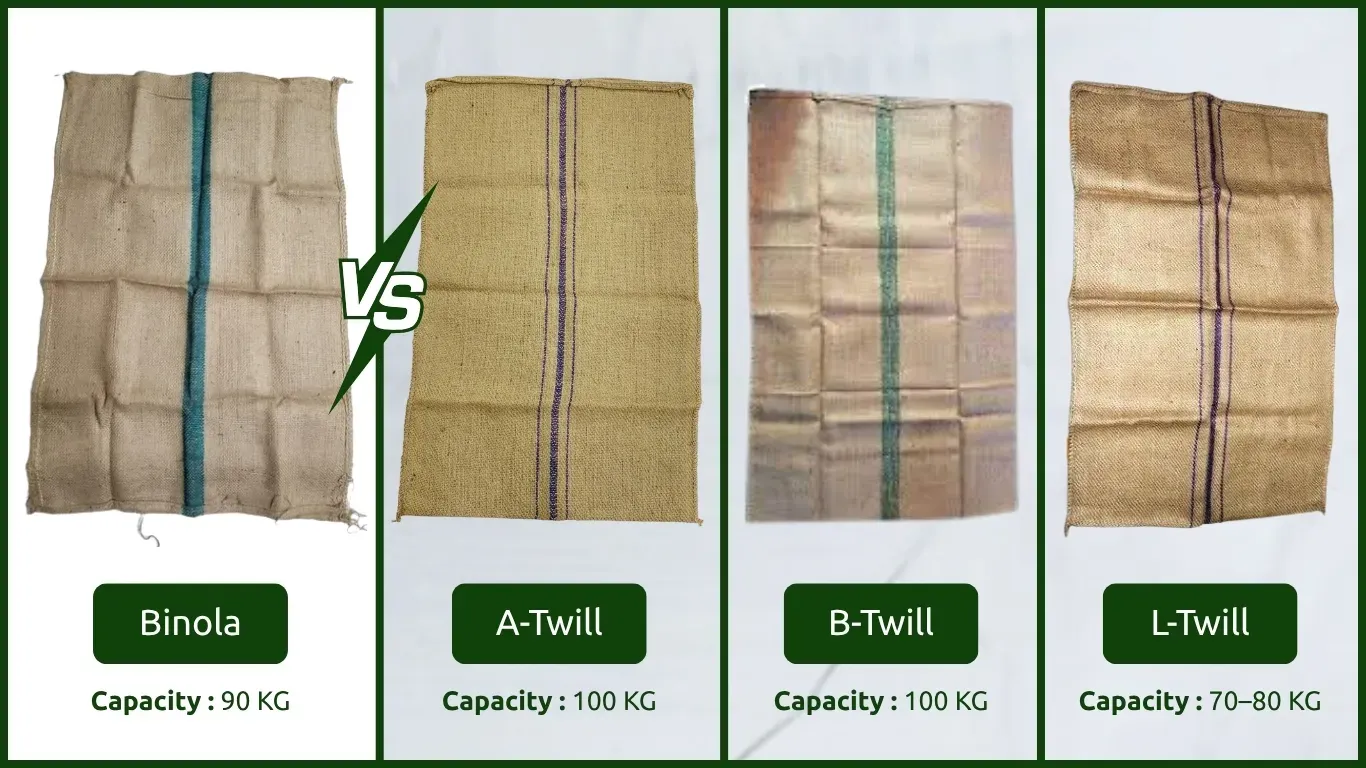
Buyers often face confusion about which jute bag variant suits their specific commodity. Here’s how Binola bags compare.
Capacity & Construction Differences
Binola jute bags are usually designed to hold 90 KG, while:
- A-Twill bags often carry 100 KG
- B-Twill also holds around 100 KG, but is slightly heavier
- L-Twill is lighter and sometimes used for 70–80 KG
Binola bags are typically coarser and more breathable, ideal for oilseed exports. A-Twill and B-Twill feature tighter weaves for finer grains or powdered contents.
Industry Applications and Export Use Cases
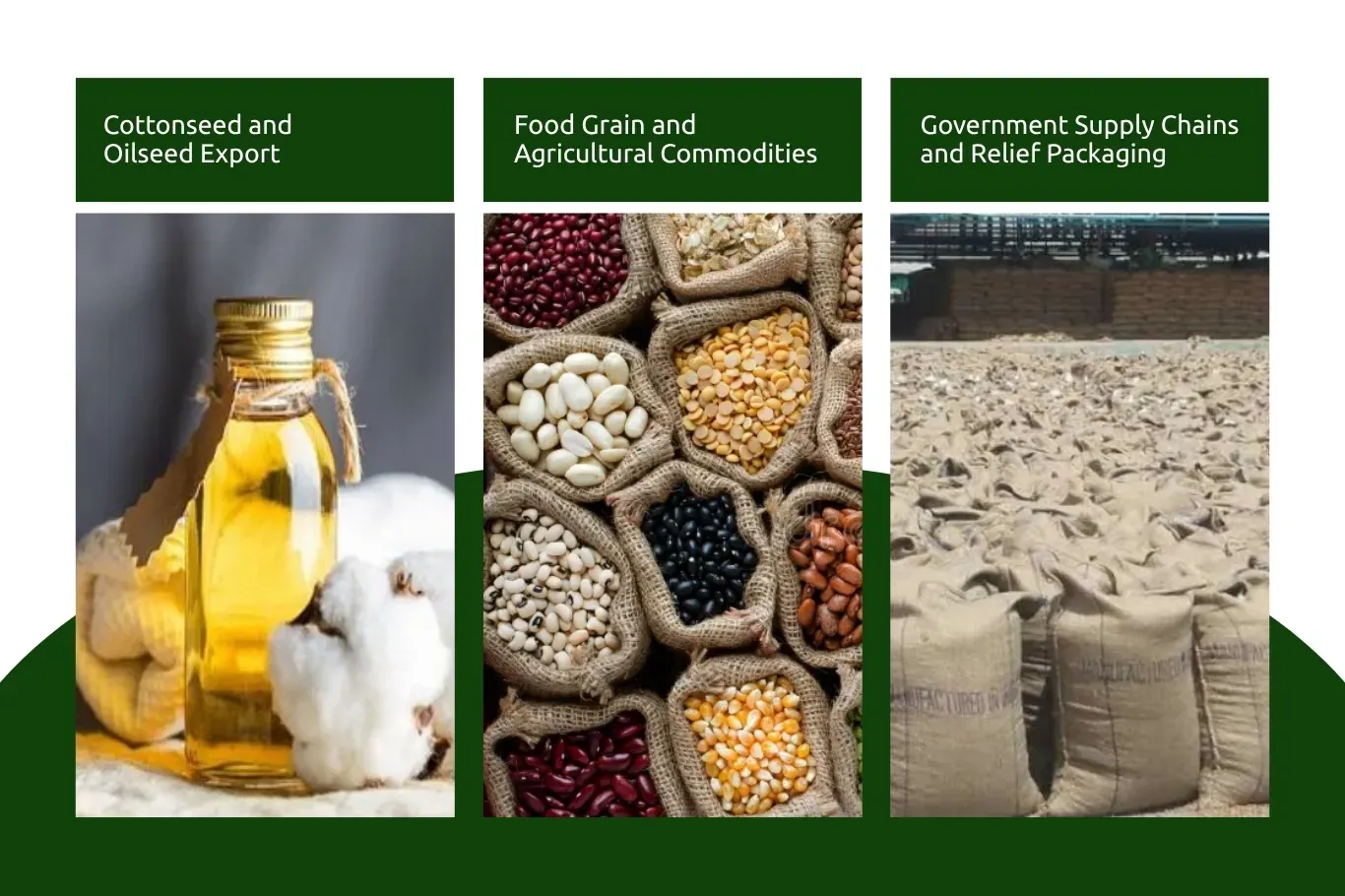
Binola bags are mostly used for oilseeds, cottonseed, or bulk animal feed exports. B-Twill is standard in grain procurement and is often specified in government food programs.
A-Twill bags are commonly chosen for crops like sugar, wheat, and rice. L-Twill, being lighter, serves domestic markets or where lower cost per unit is prioritized.
Understanding this distinction helps importers avoid product mismatch and meet their end-client packaging standards.
Export Compliance and Certifications for Binola Jute Sacks
International buyers often require proof of standards, especially when importing to countries with strict packaging regulations. This section builds trust by showcasing certifications and compliance measures.
ISO, BIS, and Other Trade Certifications
Standard Binola jute sacks are often produced under globally recognized quality frameworks. Leading manufacturers in Bangladesh and India hold:
- ISO 9001:2015 for quality management
- BSTI (Bangladesh Standards and Testing Institution) for jute bags
- SGS testing reports for strength, load, and safety compliance
These certifications verify that the bags meet international durability, packaging, and safety norms. Buyers can request batch-specific test certificates or third-party lab test results as part of the export documentation.
Country-Specific Import Requirements (UAE, EU, Africa)
Every country has unique packaging import rules, especially when bags are intended for food or agricultural use.
- UAE: Requires moisture- and dust-free packing with fumigation certificates. Binola jute bags must comply with the Emirates Authority for Standardization & Metrology (ESMA) norms.
- European Union: Demands REACH compliance for packaging materials. Many EU importers also ask for phytosanitary certificates and eco-sustainability proof.
- Africa: Governments often favor natural fiber packaging under trade agreements with Asian countries. Many ports accept Binola sacks without plastic packaging taxes.
Understanding these regulations ensures smoother customs clearance and avoids costly rejections.
Eco-Compliance for Sustainability-Focused Buyers
As global businesses push toward carbon neutrality, buyers prefer packaging materials with lower environmental impact.
Jute is recognized as a carbon-negative crop, absorbing more CO₂ than it emits during processing. It’s also free from petrochemicals, making it an ideal choice for brands looking to eliminate plastic from their supply chains.
Major global retailers, such as IKEA and Marks & Spencer, have adopted jute packaging to align with their sustainability commitments.
For exporters, offering bags with Global Recycled Standard (GRS) or OEKO-TEX® certifications can open doors to premium clients.
Imperial Jute’s Manufacturing Process
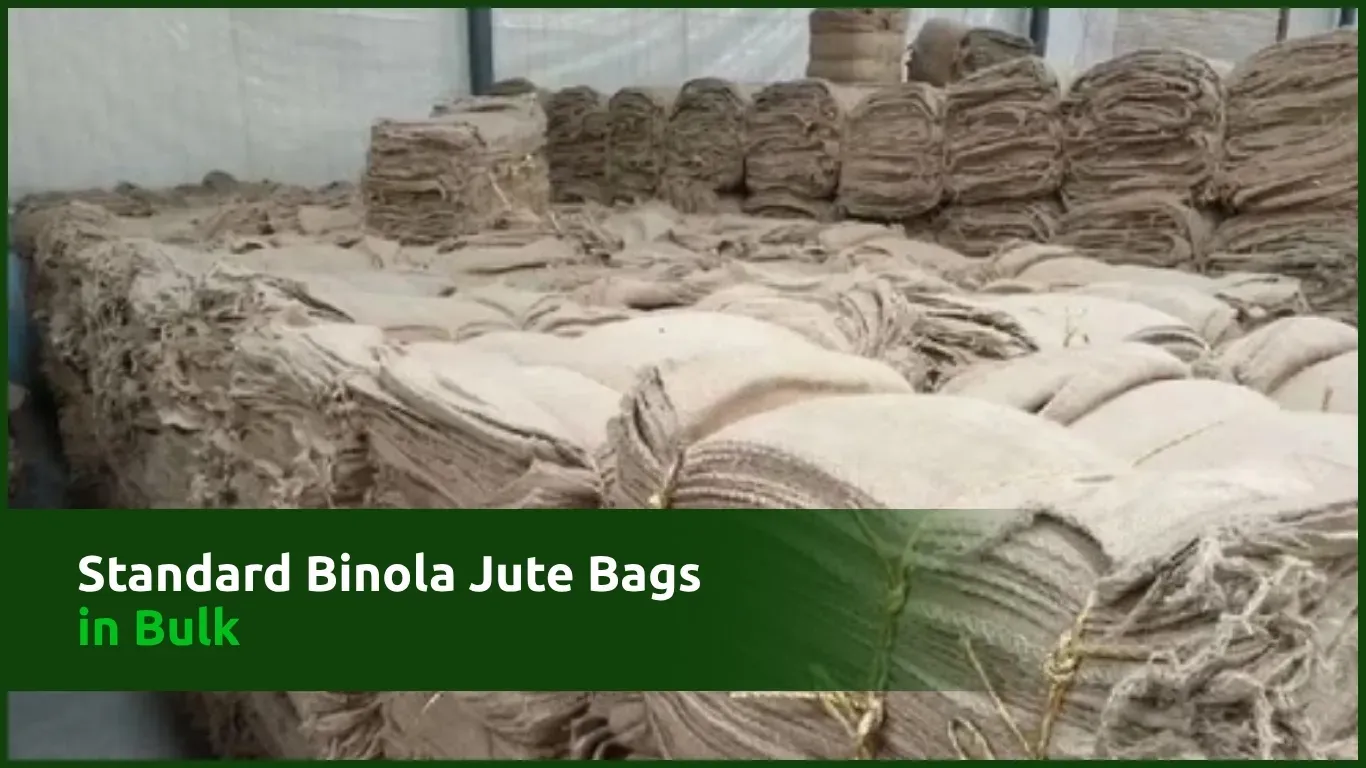
This section reassures potential buyers that the Imperial Jute is not a middleman but a direct producer with control over the entire supply chain.
Raw Material Selection and Weaving Process
The quality journey begins with selecting top-grade raw jute from certified farms in Bangladesh. Only long-fiber golden jute batches are chosen for weaving to ensure strength and flexibility.
Jute fibers are spun into coarse yarn, then fed into power looms or shuttle looms to produce Binola-grade fabric with a specific twill pattern. The GSM and weave density are adjusted to match the 90 KG load requirement.
Throughout the process, fibers are monitored for uniformity, moisture levels, and tensile strength.
Stitching, Quality Checks & Packaging
Each sack is stitched using high-torque industrial machines that apply chain or safety stitches with jute or cotton twine.
Before packing:
- Stitching is inspected for fraying or skipped seams
- Bag dimensions are verified using metal templates
- Load-bearing capacity is tested randomly from each batch
The bags are then compressed into bales with hydraulic balers. Bale tagging includes batch code, quantity, and origin for traceability. Each export consignment includes a quality inspection report and shipment photo logs for buyer review.
Customization Capability for Private Labels
We support full private-label jute sack production, including:
- Printed buyer logos
- Commodity type and weight markings
- Inner liner or multi-ply fabric for moisture protection
Customization is available for minimum orders starting at 20,000 units, with 7–10 extra days for production. We work with branding teams to match color codes, layout specs, and language preferences on each sack print.
Frequently Asked Questions (FAQs)
What is the minimum order quantity for Binola Jute Bags?
Our standard MOQ is 10,000 to 50,000 bags, depending on customization and export destination. We also offer test shipments of smaller lots for new clients.
Can I get branding printed on each bag?
Yes. We offer single-color and dual-color stencil printing options. You can send us your logo or design in vector format, and we’ll provide a digital mockup before sample production.
What is the shelf life of jute sacks in transit or storage?
Properly stored jute sacks have a shelf life of 6 to 12 months. Store them in dry, well-ventilated areas away from direct sunlight or humidity to preserve fiber strength.
